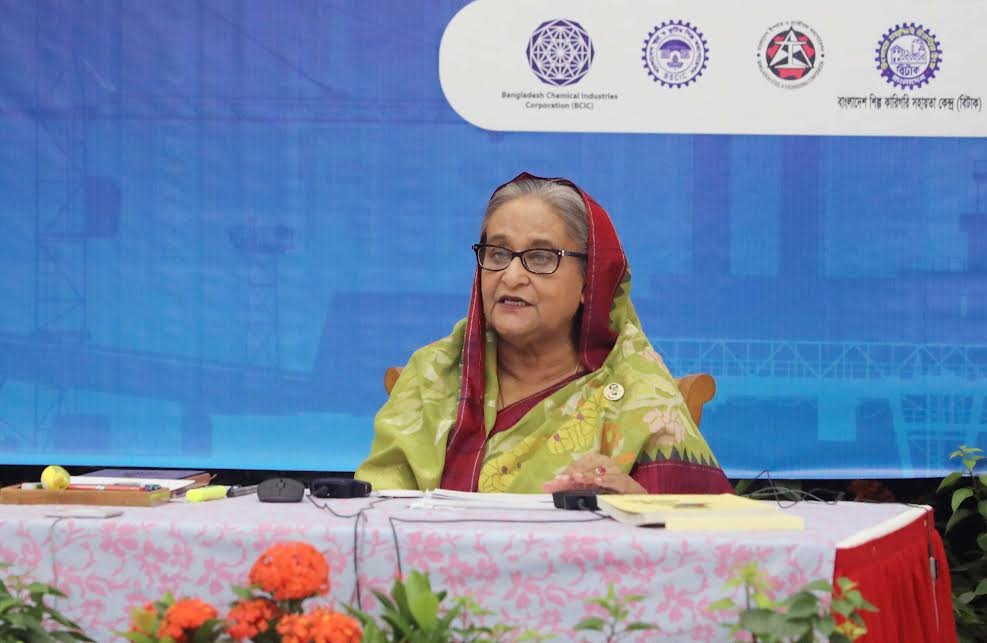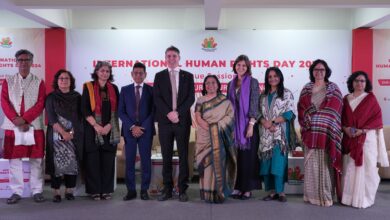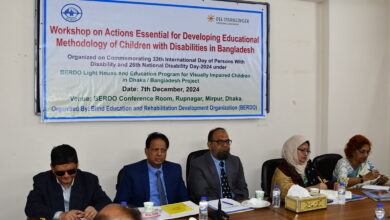Construct factories, structures protecting environment: PM

Prime Minister Sheikh Hasina today asked everyone concerned to design and construct any structure including industrial units keeping in mind the issue of environment as the climate change appeared to have exposed Bangladesh as one of its worst victims.
“We are taking steps to make everything environment friendly, starting from every industrial plant to all other establishments we are constructing,” she said as she unveiled the foundation stone of a fertiliser plant and opened four other development projects.
Mentioning that seven most green factories in readymade garment industry out of ten in the world are in Bangladesh, she said her government is taking every step considering environmental issue.
Sheikh Hasina said the government has been developing 100 special economic zones across the country.
Bangladesh attained the status of developing nation due to the realistic measures taken by the government while the country is celebrating the Birth Centenary of Father of the Nation Bangabandhu Sheikh Mujibur Rahman and Golden Jubilee of Bangladesh’s Independence, she added.
“We have many more responsibilities and will have to fulfill these,” she went on saying.
The prime minister unveiled the foundation stone of the Taka 10,460-crore Ghorashal Palash Urea Fertilizer Project in Narsingdi district, joining virtually from her official residence Ganabhaban here.
Other concerned were connected to the Ganabhaban end from Bangabandhu International Conference Centre (BICC) in the capital and the fertilizer project site in Narsingdi.
The premier also opened four development projects, including the newly constructed 14-storey head office Bhaban of Bangladesh Small and Cottage Industries Corporation (BSCIC) in the city’s Tejgaon industrial area, at the same function.
The other development projects are — Expansion of Madaripur BSCIC Industrial Estate, Establishment of Tools Institute under Bangladesh Industrial Technical Assistance Center (BITAC), and Establishment of LED light Assembling Plant under the Bangladesh Steel and Engineering Corporation (BSEC).
With Industries Minister Nurul Majid Mahmud Humayun in the chair at Ghorashal end, Bangladesh Chemical Industries Corporations (BCIC) Chairman Shah Md. Imdadul Haque delivered the welcome address.
State minister for industries Kamal Ahmed Mojumder and Secretary of the ministry Zakia Sultana spoke at BICC end.
Japanese Ambassador to Bangladesh ITO Naoki also spoke.
At the outset of the ceremony, a video documentary on these projects was screened.
Later, the cover of a book on Bangabandhu’s thought regarding industrialisation by the Industries Ministry was also unveiled.
The Prime Minister said the government is giving importance to the food processing industry with a view to boosting export of food items alongside meeting the growing demand in local market.
“If we can add value to food items by processing those, we’ll be able to export the items alongside meeting the demand in our country. Now the local market is expanding as the purchasing capacity of people has increased,” she said.
Sheikh Hasina said the government is paying special attention to the development of the agricultural goods or food processing industry as Bangladesh has gained huge success in agricultural production.
She said Bangladesh is being able to increase the production of crops, fruits, vegetables, egg, fish and meat through regular research.
“So, we’re taking various steps for this (to develop the food processing industry),” she added.
The head of government said they have taken steps for making the human resources appropriate for the 4th industrial revolution in the country.
The National Industrial Policy-2021 was finalized and Taka 4,065 crore was allocated against 33 projects under the Industries Ministry in the 2021-22 fiscal year, she added.
She said the contribution of industries to the GDP is now some 35 percent because of her government’s policy and programmes.
She continued that they have taken many measures for the development of Bangladesh since the formation of her government for the second time in 2009.
“I express gratitude to the people. Since they voted us to power for long, we’ve been able to develop Bangladesh,” she said.
The Prime Minister said the Awami League government has been able to raise the export income to US$ 45,386 million in the fiscal 2020-21from only $ 15,565 million in the fiscal 2008-09. Now, Bangladesh exports 766 goods to 202 countries across the world, she said.
She said her government has been able to illuminate every house by bringing the 100 percent areas of the country under electricity coverage in the Mujib Year as per her commitment.
Sheikh Hasina said they turned the country into “Digital Bangladesh”, reached broadband connectivity to every union and sent Bangabandhu Satellite-1 into the space.
Regarding the urea project, she said the government took initiative to set up a new high-capacity, state-of-the-art, energy-efficient and environment friendly new fertilizer factory “Ghorashal Palash Urea Fertilizer Factory” on the site of two old urea fertilizer factories at Ghorashal and Palash in 2014.
The new factory can produce some 2,800 metric tons granular urea fertilizer a day. And the production of urea from carbon dioxide will be increased by 10 percent by using the latest technology, she said.
The Prime Minister extended her sincere thanks to the Japanese and Chinese governments for providing loan assistance for this fertilizer project.
She said Bangladesh Industrial Technical Assistance Center (BITAC) is making significant contributions to the development of skilled human resources and manufacturing of imported alternative machinery parts through research.
She added BITAC’s Tool and Technology Institute (TTI) is enriching the country’s economy by creating skilled manpower in the country’s light engineering sector.
“Our government is committed to provide local engineering support for foreign investments and create new entrepreneurs in the light engineering sector,” she said.
The premier said the Tool Institute of BITAC will be instrumental in innovation of various machine and plant technologies with the help of indigenous technology. This will reduce the import of capital machinery and thus save foreign currency.
She said Bangladesh Steel and Engineering Corporation (BSEC) is currently manufacturing and marketing advanced, quality fluorescent tube lights, CFL bulbs, LED bulbs and LED tube lights.
“Following the construction of LED Light Assembling Plant at the initiative of Eastern Tubes Limited under BSEC, its products will play an important role in saving energy,” she said.
The Taka 10,460-crore Ghorashal Urea Fertilizer project got nods of the Executive Meeting of the National Economic Council (Ecnec) in October, 2018 to set up a new urea factory with an annual production capacity of 9.24 lakh metric tons.
Currently, two factories there — Ghorashal Urea Fertiliser factory and Palash Urea Fertiliser Factory are annually producing 3.15 lakh metric tons.
Bangladesh Chemical Industries Corporation (BCIC) is implementing the project to set up a granular urea factory at Palash, adjacent to the existing two factories, with a daily production capacity of 2,800 metric tons.
Of the project cost, Taka 1,844 crore will come from the national exchequer while the rest Tk 8,616 crore from bidders.
Besides, the 14-storey eco-friendly skyscraper for BSCIC Head Office was constructed at the cost of Taka 84 crore in order to ensure a better work environment and bring dynamism in the operation of the corporation.
The 126,900-sq feet multi-storied building will house the BSCIC head office, regional office and project offices. Solar system and rainwater harvesting system are there in the modern tower.





